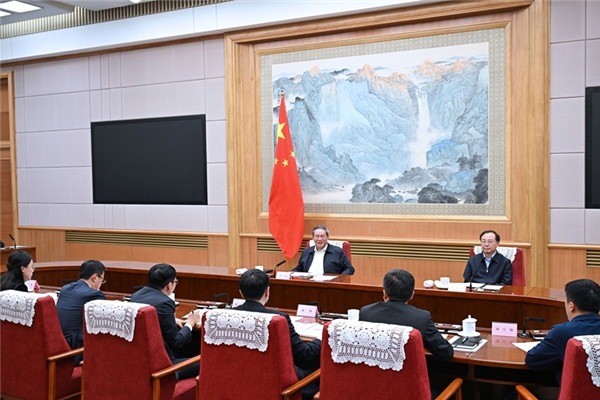Firms chip away at weak points in AI


Amid tech protectionism, Chinese companies beef up expertise in semiconductors
On a hot summer afternoon in July, Tsinghua University in Beijing glimpsed a sneak preview of the future of artificial intelligence and its implications for technology and businesses in China.
An autonomous bicycle steered itself along the main playground on the university campus. It automatically avoided obstacles, tracked objects and responded to voice commands. At the bike's core was a newly developed chip called Tianjic.
The chip combines computer science-based machine learning and brain-inspired approaches. Tianjic's developers believe it is the next step toward achieving general artificial intelligence.
General AI refers to a machine's ability to learn any intellectual task that a human being can perform. It has long been viewed as a grand dream among the industry circles, given that currently all AI-powered applications are narrow AI. That is, they can only surpass human beings in one aspect. For example, they can play either Go or guitar. They can't perform both tasks, whereas a human being can play the guitar, play Go, and perform many other tasks.
But the Tianjic chip is expected to stimulate general AI development by paving the way for more generalized hardware platforms, said Shi Luping and his colleagues at the Center for Brain Inspired Computing Research at Tsinghua University who have designed and developed the chip.
"Using just one chip, we can demonstrate the simultaneous processing of versatile algorithms and models in an unmanned bicycle system, realizing real-time object detection, tracking, voice control, obstacle avoidance and balance control," Shi and his colleagues wrote in a paper published in the journal Nature late July.
The new chip shows Chinese researchers and companies are working hard to beef up the nation's chip capabilities amid rising protectionism in the world of technology. They are scrambling to grow expertise in chip design, manufacturing and packaging, in order to overcome the nation's heavy reliance on foreign semiconductor technologies.
From May 16, when Washington imposed a ban on Chinese tech company Huawei from purchasing any US-originating technologies without special government approval, to early July, when Japan hit South Korea with sanctions on crucial supplies of semiconductors, the global electronics industry faced mounting uncertainties. Semiconductors were at the heart of public discourse in this regard.
Against such a backdrop, analysts, investors and senior executives said that Chinese chip companies should strengthen their prowess by better leveraging the strategic opportunities brought by AI and the internet of things.
"As the US government moves to tighten control of key technologies including premium processors, China is facing an unprecedented opportunity to build up its chip capabilities," said Huang Qing, China managing director of Walden International, a US venture capital company focused on cross-border investments.
China has the world's leading system integration companies in mobile phones, 5G communications, security and other areas. They traditionally tend to cooperate with European and US suppliers.
But as the US government moves to impose export controls on Chinese technology firms, they have begun to feel an urgent need to work with domestic semiconductor companies, Huang said.
"By serving such tech giants, Chinese chip companies have an unprecedented opportunity to grow into global players," Huang said, adding that the country now uses more than half of the world's semiconductors.
His comments are in line with Chinese chip industry's impressive strides in the past decade. In 2018, the country's indigenous chip sector recorded 653.2 billion yuan ($93 billion) in sales revenue, up 20.7 percent from a year earlier, faster than the global average, data from the China Semiconductor Industry Association showed.
But, China, the world's largest semiconductor market, still spent more on importing chips than crude oil in recent years. In 2018, its chip imports exceeded $300 billion for the first time, up from $260 billion in 2017, according to data from the Ministry of Industry and Information Technology.
Pan Jianyue, founding partner of SummitView Capital, a Chinese investment company, said there are still many weak points in China's chip industry including raw materials, manufacturing equipment, chip design tools, and the lack of crucial intellectual properties.
But that does not mean that China does not have opportunities to grow. Instead, the wider use of AI and the increasing popularity of internet of things applications will give rise to a new wave of computing brands and chip companies, analysts and investors said.
Li Liyou, the former CEO of Spreadtrum Communications, a major chip maker in China, said the AI chip market sales will hit $16 billion in 2022, with half of demand coming from cloud-based training, 25 percent from cloud-based inference computing, and the rest from areas that use edge and end-side AI chips.
"AI is one of the areas of concern for the US government, and it is likely to be more difficult to access high-end US AI chips in the future. Chinese companies need to beef up their research and development strength in this respect," Li said.
But he also warned that it will be hard for small startups to catch up with the technological evolution as defined by Moore's Law, a key rule that has affected the integrated circuit sector for a long time.
Agreed Huang from Walden International. According to him, China now has about 632 chip design companies, 87 percent of which employ less than 100 people. It is almost impossible for these startups to compete with global giants which boast dozens of thousands of employees.
"As more money floods the semiconductor sector, the capital will become increasingly fragmented and go into a string of small companies. The battle for chip talent will also be increasingly intense," Huang said.
Ding Wenwu, president of China Integrated Circuit Industry Investment Fund Co Ltd, said chip design has become a focus area for investors as it has a lower technological threshold and generates quicker returns on their investments. But, in fact, more efforts are needed to bankroll the chip material, equipment and manufacturing segments, he said.
"Currently, investors are interested in the chip industry, but it is important to ensure the right investment direction. It is important not to put all the money into semiconductor design. China is lagging behind advanced countries in chip material, equipment and manufacturing, all of which need heavy resource inputs," Ding said.
According to him, only with a balanced growth in all of the above areas can China's domestic semiconductor industry achieve sustainable development.




































